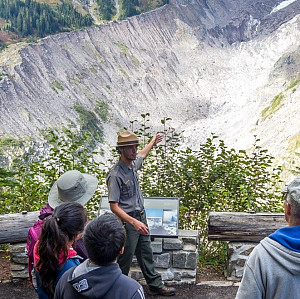Environment and Sustainability

Amos Almy
Class of 2013 | Mount Rainier National Park
Major(s)
Minor(s)
Current Position
Employer
About
I work as an Interpretive Park Ranger for Mount Rainier National Park. An interpreter, as many know, translates one language to another. So what languages do I speak? In English, I speak for the natural and cultural resources of the Park. Many visitors find scientific and historical information of the resource difficult to understand, so I find fun and engaging ways to talk about glaciers, volcanoes, history, etc. Our hope as interpretive rangers is that through a better understanding, visitors will connect with the Park and then through that connection will come stewardship. If a person is stomping off trail on delicate sub-alpine flower meadows, they most likely do not understand their impact on the land. After a Ranger explains the harsh environment these flowers survive in and how delicate they are, that person may then understand the importance of staying on trail and will want to protect that environment. The visitor may now be a steward for the land.
Impact of Ursinus
Ursinus’ Environmental Studies program has a strong emphasis on interdisciplinary learning and critical thinking. These two aspects allowed me to realize that no singular problem in the world has a straightforward, easy answer. Climate change is a multi-faceted problem but its evidence is strewn throughout our National Parks. These sites serve as an outdoor classroom to educate visitors on environmental issues, especially in providing examples of climate change. With critical thinking, appreciation for the outdoors, and my position as a Park Ranger, I feel I have the ability to share the environmental impacts of humans with many different audiences and hope it will make a difference for the future.
Piece of Advice
Before graduating Ursinus in 2013 I accepted a Student Conservation Association internship working for Wrangell-St. Elias National Park and Preserve in Alaska. The position lasted 3.5 months and entailed something called “interpretation”. Once I was there I immediately began to fall in love with the place, as well as the work. I was surrounded by mountains and glaciers, learning about a new environment and an unheard story of American history. I then shared that information with any visitor that would listen, hoping they would develop the same passion and love that I had built inside myself.
That summer I learned all about the National Park Service and how to become a Park Ranger from my employed co-workers. The following winter and spring I applied for over 75 Park Service jobs, with the hope that my previous Park would hire me back as a real Interpretive Park Ranger. In the spring my previous supervisor called me, and I quickly accepted the position. Since then I have spent 2 more summers in Alaska (2014, 2015), and accepted another position at Mount Rainier National Park in 2016.
My hope is that through interactions with visitors, they will become stewards of the land even when they leave the Park. I hope visitors realize their impact on the environment and will want to minimize it, so that these lands can be enjoyed by future generations.
Paying It Forward
Do not underestimate the power of critical thinking. If you can see past yourself and find the bigger picture, or the root of the problem, then you are already more knowledgeable than most. To find a viable solution requires finding the true problem. There are many issues facing our environment today, but with critical thinking we stand a chance battling these forces.